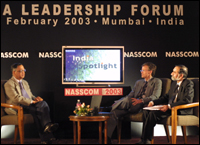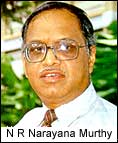Home > Business > Interviews
The Rediff Interview/N R Narayana Murthy, Infosys chairman'Biz leaders must put community above own interest'
Our Correspondent in Mumbai
February 12, 2003
 At the National Association of Software and Services Companies' annual conference in Mumbai, the spotlight was on Infosys chairman and chief mentor N R Narayana Murthy.
At the National Association of Software and Services Companies' annual conference in Mumbai, the spotlight was on Infosys chairman and chief mentor N R Narayana Murthy.
As part of the inaugural session on Tuesday, Murthy fielded a range of questions ranging from the digital divide in India to how the Infosys success model can be replicated.
The questions were posed by Kiran Karnik, president, Nasscom and Peter Sutherland, Canadian High Commissioner in Mumbai.
Excerpts from the discussion:
Do you think that India has lost the battle in the hardware sector?
Thanks to certain policies adopted in the seventies like phased manufacturing programmes and the protectionist regime, the Indian hardware sector is lagging today.
However, I feel that all is not lost yet. There is still a significant opportunity in terms of after sales service and system integration that the sector can tap into.
I do think that it is still possible for us to become leaders in the global hardware industry.
What would your advise to our political leadership be?
I think that an ideal political leader in India is one who understands that there are two Indias.
One is the urban India where the children go for the latest movies and go to Pizza Huts. The other is the rural India where the children do not know where their next meal is coming from.
 To solve the problem of rural India the political leadership should strengthen the urban industrialised India that will help create more jobs. The leader needs to straddle both these worlds in order to bring them together and not neglect one or the other.
To solve the problem of rural India the political leadership should strengthen the urban industrialised India that will help create more jobs. The leader needs to straddle both these worlds in order to bring them together and not neglect one or the other.
What role can IT play in bridging the divide between the rural and urban India otherwise called the digital divide?
Information technology can play a significant role in bridging the divides. It already is impacting the economy by enhancing exports, creating jobs and raising confidence of youngsters in the country.
But it can do a lot more by making sure that the government becomes more accountable to the people. It can bring in a greater level of transparency and that is when it will really make a difference.
E-governance is where IT can create a lot of difference.
What is your advise to business leaders?
If you put the interest of the community above your own interest you will emerge the winner. That is the fundamental difference I have observed between the developed and the developing countries.
If you follow a value system, which according to me is just a protocol for conducting business in a community, then you can achieve a lot more. The past has no value in the current context and gloating about the past will not help.
You are only as good as you can do in the next quarter. That is what the market expects out of you. No one is interested what your performance was in the last quarter.
People are looking to see how you will do in the next quarter. If we can bring something valuable to the global bazaar then we will be well respected.
What needs to be done to replicate the success of Infosys and create more corporations like it?
I tell people that if India has to overcome its poverty we need hundreds of Infosys. When I speak to young people I tell them that first they need to get hold of a great idea.
The idea should have a value proposition like it can bring down customer costs or increase productivity or expand the customer base.
This value proposition is something that should be able to be written in a simple sentence, not a compound or complex sentence. Then they need to put together a team consisting of people with the right kind of skills and see what needs to be done to sustain the enthusiasm of this team.
And they need to dream big and have confidence in themselves.
What is your expectations for the next 24 months?
You need to foster greater customer focus and need to bring in a better value proposition than before. Leaders have to be able to walk the talk and most importantly you need good risk mitigation strategies.
What is your vision for India?
My vision for India is that every child should have access to the best possible education and feel confident that he or she will have an opportunity to play a significant role in shaping the destiny of India. Indians should be proud to say that we are Indians.
What kind of music do you listen to?
I like Western classical music. I do listen to Indian classical music and Hindi film music, but I like Western classical music a lot.
My father was very fond of it and I once asked him what he liked about it. He told me something that is very profound. In Western classical music, a symphony for instance, each person -- the pianist, the cellist, etc -- is a talented and skilled person, but all of them play together as a team to the subordination of this one person called the conductor.
These individuals could get together and create something that is so divine is amazing. I think that India has to work together like that to ensure its success.
More Interviews